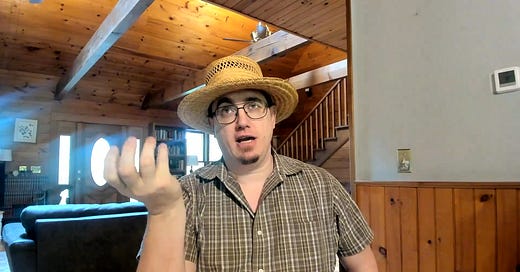Dr. Joseph Minich, residential teaching fellow at The Davenant Institute, joins
- before you go further, subscribe to his Substack, Laughing with God - and Joel Carini this week on The Flâneur and the Philosopher. Our topic is the ideology of Mark Dever’s Nine Marks ministry. While on the face of it, designed to limit the pastor’s authority to the word of God, we detect in Nine Marks’ teaching an unjust accruing of authority to the sole preaching pastor.Dr. Minich tells us about his review of Jonathan Leeman’s Political Church, an account of church authority arising from Nine Marks’ ministry. Leeman, in that book, attempts to argue that pastors have a spiritual authority, less than that of God, but greater than that of any congregant with a Bible. But is that the nature of church office and church authority? Or is there no spiritual distinction between clergy and laity?
and I also present our critique of the ideology of expository preaching and the church-focused Christian life. It is laudable to aspire only to preach what is consistent with biblical teaching. And yet, in so restraining the pastor, we deny the capacity and duty of exercising human reason and judgment, which are the only way to apply Scripture to the messy complexities of concrete life. Given that the pastor is not the expert on life in all its complexity, this also opens up a parity among wise, mature Christian individuals: the priesthood of all believers.This summer, Dr. Minich will be offering a course at Davenant House, “Reading the Bible and the World: Protestant Wisdom Foundations I.” Learn more and sign up here.
Listen on Apple Podcasts, Spotify, or watch on YouTube.
Sound Bites
"They have tried to make it possible to do so with imbeciles by making the process of arriving at that so simple that you could train a 20 something to do it effectively."
"There is a conflation of what really ought to be authority, where you need wisdom, you need to be able to judge, to govern, you need to exemplify the things that you're talking about versus leading, which is usually a matter of gifting."
"They speak with an absolute authority because the minister, if they deviate from this, is perceived as a rogue."
"You're outsourcing your own judgment, whether your moral conscience or your intellectual firing, rather than them turning around and saying, hey, you should read books and also it's really hard to know things and it could take a while to really know something and do that, grow."
"There's a lot there, and the pastor who says on bioethics, I am a little bit beyond my wheelhouse - Mr. Christian with an MD, you have some insights here, but you also need some philosophy because being a doctor alone doesn't help you just realizing like the complexity of all the different types of knowledge."
"The appropriate way to approach it is that the pastor is really just the end stage of any godly man in the congregation who meets the qualifications."
"Don't come ask me everything. Actually, you grow wise."
"The church and its leadership can become like the kind of boyfriend or husband who makes you need them so badly. It's almost abusive."
"If the way that you are engaging with the people you love and serve is that they can't do anything without you, that's the opposite of what you're supposed to be doing."
Chapters
00:00 Introduction and Background
02:05 Personal Background and Involvement with Davenant
06:22 Critique of Jonathan Lehman's 'Political Church'
13:17 The Dangers of Clerical Caste and Man of God Syndrome
23:24 Equipping the Saints and Cultivating Independent Thinking
28:08 The Parent-Child Dynamic in Pastoral Relationships
36:18 The Dangers of Dependency on Pastors
37:55 The Limitations of Pastors' Expertise
39:20 Cultivating Wisdom and Knowledge Among the Congregation
41:30 The Role of Pastors as Informational Vending Machines
45:42 The Importance of Raising Up New Pastors Within the Church
49:53 Focusing on the Practical Aspects of the Christian Life
53:05 The Relationship Between Authority and Submission
58:23 The Role of Pastors in the Lives of Congregants
01:00:53 The Anxious Relationship to Knowing
01:03:45 The Responsibility of Congregants to Cultivate Wisdom
01:06:40 The Growth and Development of the Congregation
01:11:03 Cultivating Wisdom and Independence
01:12:58 The Role of Elders as Guides
01:13:54 Accountability and Humility in Leadership
01:16:28 The Role of Parachurch Organizations















Share this post